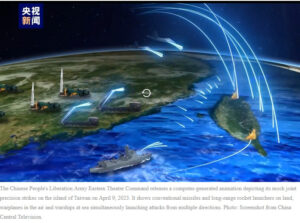A visit to two of Taiwan’s dwindling number of allies with stopovers in New York and Los Angeles that China, which seeks to isolate the country preparatory to annexing it, by force if necessary, had warned would have “serious consequences.” The rhetoric escalated should Tsai meet with Speaker of House Kevin McCarthy. McCarthy, having already backed away—allegedly at the Taiwan government’s request—from his campaign promise to visit Taipei if chosen as speaker, could ill afford to renege on, thereby setting the scene for widening already tense Sino-American relations. State-controlled media thundered that “the form and degree of the counterattack will depend on specific circumstances; the initiative is on our own hands… and will result in tighter constraints on [Taiwan].”
Retaliation was swift. The maritime safety authority in Fujian, the province nearest Taiwan, immediately announced its right to on-site inspection of cargo ships and construction vessels in the Taiwan Strait “to ensure the safety of vessel navigation,” with the Taiwan government ordering shipping operators to refuse. A day later, the Chinese military began exercises: the first day aimed at seizing control of the sea, air, and communications sphere, with day two simulating strikes on airfields, important nodes in Taiwan’s military system, and mobile targets. The exercises were accompanied by a computer-generated animation depicting its mock joint precision strikes showing simultaneously launched attacks by conventional missiles and long-range rocket launchers on the land, warplanes in the air, and warships at sea.
In Taiwan, the reaction was subdued—“we’ve been through this before”— albeit with some apprehension at the greater intensity of the exercises. Speaking to a bipartisan delegation of visiting US congresspersons led by the chair of the House Foreign Affairs Committee, Michael McCaul, President Tsai did not mention the exercises, saying only that her country would continue to work with the US and other like-minded countries to jointly defend the values of freedom and democracy. Speaking to American media thereafter, McCaul stated that the US sending troops to Taiwan is “on the table” if China invades.
Meanwhile, Tsai’s predecessor, the China-friendly Ma Ying-jeou, having chosen to visit the mainland exactly at the time of her visit to the US, blamed Tsai for leading Taiwan into danger and stated flatly that Taiwan would have to choose between peace and war. For all Beijing’s incendiary rhetoric, that’s unlikely to happen immediately. Taiwan has a presidential election coming up, with Tsai, the longtime standard-bearer for the Democratic Progressive Party (DPP), unable to run again. Vice-president William Lai, the DPP’s putative candidate, is well regarded, though Taiwanese voters, like their American counterparts, have previously demonstrated a penchant for alternating parties in power. Beijing does not like Lai, whose record indicates opposition to annexation by China, and would prefer a candidate from the opposition Kuomintang (KMT), where several candidates who might be marginally better from Beijing’s point of view are vying for the nomination. But, who given the public’s wariness about China, may not be electable.

______________________________________________________________________________________________________________________
 June Teufel Dreyer
June Teufel Dreyer
June Teufel Dreyer is Professor of Political Science at the University of Miami, Coral Gables, Florida, and a senior fellow of the Foreign Policy Research Institute. Formerly senior Far East specialist at the Library of Congress, she has also served as Asia policy advisor to the Chief of Naval Operations and as commissioner of the United States-China Economic and Security Review Commission established by the U.S. Congress. A graduate of Wellesley College and Harvard University, she has lectured to analysts at the National Security Agency and the U.S. Joint Security Operations Command (JSOC).
Dr. Dreyer’s Middle Kingdom and Empire of the Rising Sun: Sino-Japanese Relations in Historical Perspective, which received the Japan Institute for National Fundamentals’ 2017 prize for best book of the year, was published by Oxford University Press with an updated paperback edition in 2018. Taiwan Under Tsai Ing-wen, co-edited with Jacques de Lisle, appeared in April 2021. The eleventh edition of her China’s Political System: Modernization and Tradition, is now in press. Her current research focuses on Sino-Japanese Relations, Chinese domestic and foreign policy; Taiwan studies, and Asia-Pacific Security issues.



 June Teufel Dreyer
June Teufel Dreyer


